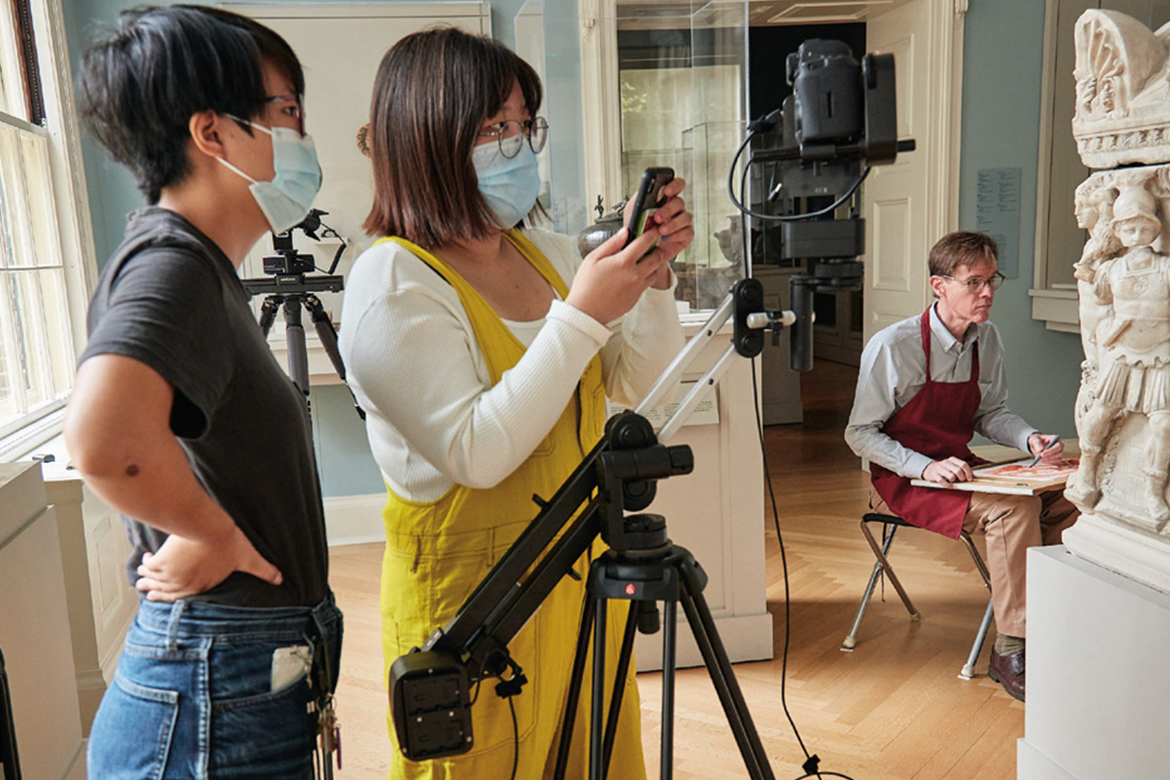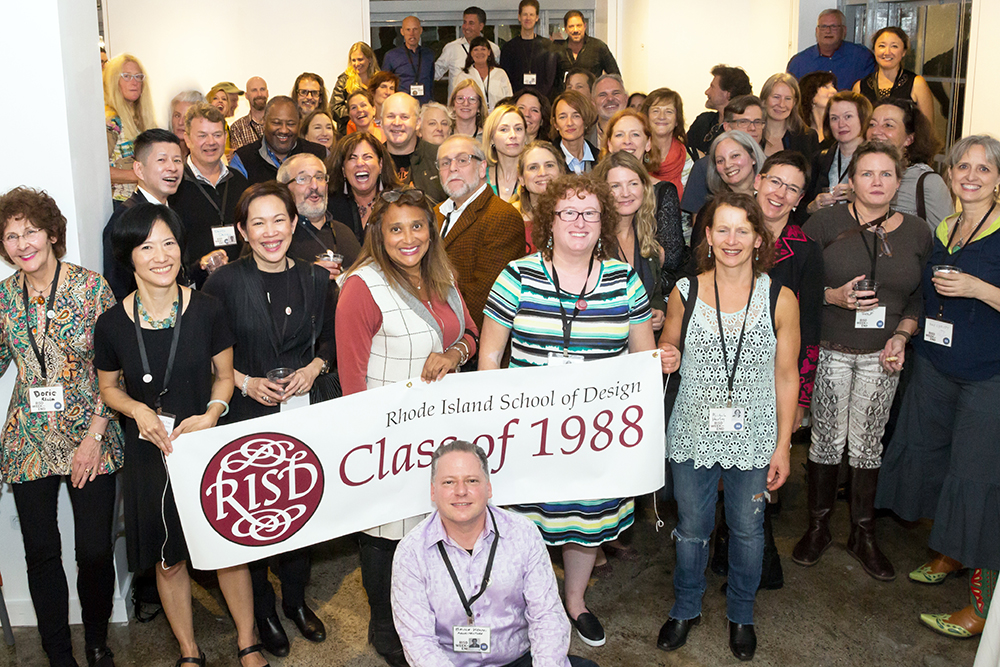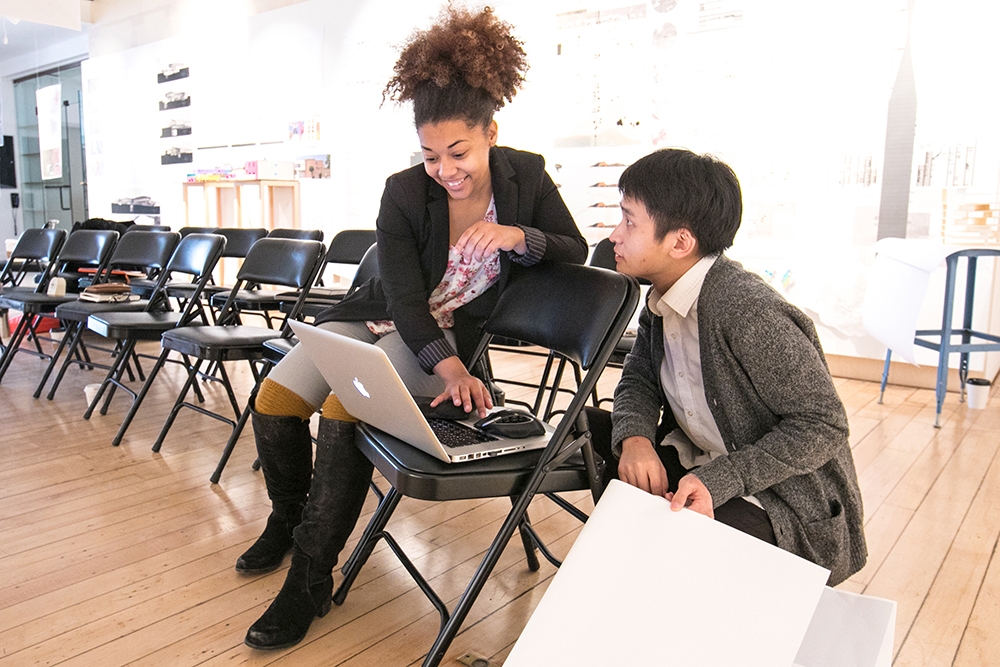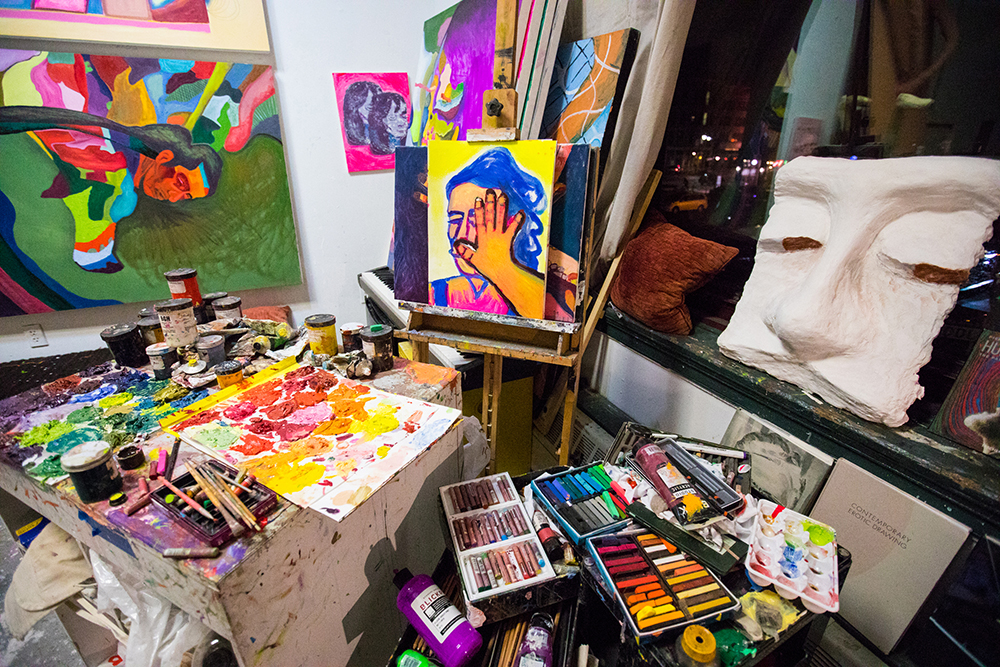
Enriching Art and Design Education
RISD Museum preprofessional programs provide new avenues for learning and career development.
Students have many opportunities to pursue in-depth projects and learn alongside RISD Museum staff mentors. These paid positions provide financial support, offer explorations of museum practice and theory, and deliver valuable career skills. Students work with curators, educators, designers and conservators, and with a wide range of collections.
Dorian Juncewicz MArch 15 served as a graduate assistant at the museum from the fall of 2013 through the spring of 2015 and worked on installations and planning for gallery spaces. “My assistantship at the RISD Museum gave me a lot of my first experiences working in the exhibit development process. I had the opportunity to work closely with curators, installers and graphic designers to create architectural plans and rendered drawings on a vast range of permanent and temporary exhibitions. I also produced my first technical-bid drawings to send out to external fabricators, which is a large part of my responsibility now as senior exhibit designer for the Museum of Science in Boston,” she says.
“Manager of Installation and Preparation Stephen Wing and his team were extremely generous with their time to introduce me to all aspects and inner workings of how an exhibit is produced from start to finish and made me feel like I was a valuable contributor to the process. I am certain that my RISD Museum experience greatly enhanced my opportunities to be hired in a museum exhibition department because there is such a small community of exhibit design professionals and previous museum experience is rare.”
Juncewicz’s experience reflects the museum’s hands-on approach to its preprofessional programs for students. While working in these roles, students also engage with global and local perspectives that expand their horizons beyond RISD. Each program proactively introduces students to social, cultural and ethical contexts of art and design and invites them to contribute their perspectives to museum exhibitions, publications and programs. Preprofessional programs also offer a pathway toward diversifying museums, arts and cultural organizations.
Students with graduate assistantships take on significant creative responsibility for projects that complement their studies. This year, graduate assistants are working on projects such as helping to plan and organize exhibitions and creating digital content about the collection. They also are using graphic design to build digital experiences, wayfinding, tours and in-gallery content. The museum offers approximately 10 graduate assistantships each year, and the students work closely with a number of departments, including curatorial, education, installation and creative services.
Spalter Teaching Fellowships offer a hands-on introduction to museum education. These two-year experiences with K–12 students at the museum and on-site in their schools are open to RISD and Brown University graduate and undergraduate students from all disciplinary backgrounds. Made possible with support from RISD Board of Trustees Chair Michael Spalter, these highly sought-after fellowships connect students’ studio practice and areas of study with the RISD Museum’s collection. Fellows also build relationships with schools, educators, students and teens in Providence and across Rhode Island.
Joan Hall and Mark Weil Conservation Fund Fellowships are open to undergraduate students from all disciplinary backgrounds with a two-year commitment. The museum’s conservation team provides professional training to introduce fellows to collections care and preventive conservation of the museum collection. Fellows support both the care of original works of art—including condition reporting, written and digital photo documentation, basic cleaning of art, stabilizing of art, preparing art for loan and travel—and monitoring works on display and in storage. Museum benefactors Joan Hall and Mark Weil generously endowed these opportunities.
Undergraduates from local colleges and universities in the Museum Guild work to advance representation, inclusion and advocacy for student voices in the museum space. With guidance from the museum’s academic programs staff, the group develops projects and programs that highlight student interests, promote diversity and create critical dialogue around the collection. Last year, the group built Unravel: An Anti-Exhibition, a digital publication that diverges from the museum practice of showcasing finished work. Unravel foregrounds the creative processes and unfinished work of student artists making art during the pandemic.
The Andrew W. Mellon Foundation created an endowment to launch an internship program in its name. The Fain family established the Jean Segal Fain Memorial Internship in memory of Jean Segal Fain, a past honorary trustee for RISD and former employee and volunteer with the museum. Summer internships combine deep project-based learning with a holistic introduction to thinking about, and working within, museums and cultural institutions. Studio Institute has supported internships for the past several years that provide opportunities for interns to work with various museum departments.
Elizabeth Xu 23 FAV enjoyed her Mellon internship this summer and worked on the museum’s Drawing Closer publication with the digital initiatives team. “We filmed and edited a series of videos to introduce the making and usage of three different mediums with Professor Andrew Raftery in Printmaking,” she says. “Thinking and working collaboratively with people who have different priorities and perspectives forced me to think about the reception of my work and its intended audience. It was very different from working in the studio, where the only person you really have to satisfy is yourself.
“One of the biggest things I learned was that every museum is thinking about its purpose. I never fully realized that museums each had their own identity and filled a different niche. The expectations placed on these museums inform the identities, which in turn seem to form the ethos around which exhibitions and activities are built. I was also surprised how interconnected each department in the museum is with the others. There’s constant negotiation when brainstorming and creating something new. That makes each individual capable of influencing the final output of an exhibition layout, publication or activity. It’s much more collaborative than I realized.”
The museum’s work-study positions are another avenue of financial support and learning. Meaningful work-study offers more than just hourly compensation; it provides students with opportunities to engage directly with art, design and public programs.
“Every dimension of the museum’s work is strengthened through the presence of students who make critical contributions while learning and growing with the staff,” says Sarah Ganz Blythe P 22, interim director of the museum. “While many students explore career paths in cultural institutions, others are interested in the museum as a space to challenge existing structures and to share their creative practice with the public.”
Cover photo: Yingxi Ji MFA 22 GD, graduate assistant (right), and Elizabeth Xu 23 FAV (left), Andrew W. Mellon intern, shooting a video of RISD faculty Andrew Raftery, professor of Printmaking, explaining the use of different drawing materials in the museum’s 400 Years of Drawing publication. Photo by Erik Gould, courtesy of the RISD Museum



